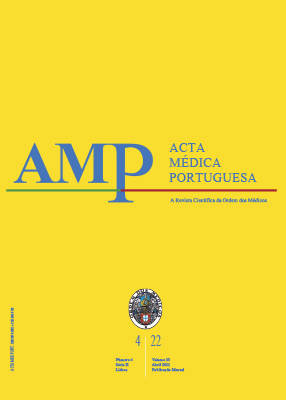Pre-Exposure Prophylaxis for Human Immunodeficiency Virus in the Medical Curricula in Portugal: A Cross-Sectional Analysis
DOI:
https://doi.org/10.20344/amp.15446Keywords:
HIV Infections/prevention & control, Pre-Exposure Prophylaxis, Students, Medical, Surveys and QuestionnairesAbstract
Introduction: Pre-exposure prophylaxis (PrEP) has gained relevance as a method of prevention for HIV in certain people and settings. Following the publication of the guideline on PrEP prescribing in Portugal, we aimed to assess the knowledge of Portuguese Medical Students about PrEP.
Material and Methods: An online survey was sent to Medical students of Portuguese Medical Schools. We conducted a descriptive analysis of the results and an analytic cross-sectional study to identify factors associated with “knowing about PrEP”, “having had one class about PrEP” and “identifying eligible groups correctly”.
Results: Of the 796 students that responded to the survey, 64.6% were aware of what PrEP is. Of these, 34.44% acquired this knowledge during their training. Out of the total amount of respondents, 4.77% could identify correctly and completely the eligible groups for PrEP. As the training years went by, the probability of being aware of PrEP, having had one class about PrEP, and identifying the eligible groups correctly, increased. Of the sixth-year students, 43.48% had had one class about PrEP and among the students that were aware of PrEP, 28% identified what the eligible groups were. After adjusting for the school year, we found differences between Medical Schools regarding the outcomes. The association between the different ways of learning about PrEP and the ability to correctly identify eligible groups for PrEP was not statistically significant.
Conclusion: The differences between Medical Schools could be harmonized through changes in the medical curricula that would allow this topic to be addressed more often.
Downloads
Downloads
Published
How to Cite
Issue
Section
License
Copyright (c) 2022 Acta Médica Portuguesa

This work is licensed under a Creative Commons Attribution-NonCommercial 4.0 International License.
All the articles published in the AMP are open access and comply with the requirements of funding agencies or academic institutions. The AMP is governed by the terms of the Creative Commons ‘Attribution – Non-Commercial Use - (CC-BY-NC)’ license, regarding the use by third parties.
It is the author’s responsibility to obtain approval for the reproduction of figures, tables, etc. from other publications.
Upon acceptance of an article for publication, the authors will be asked to complete the ICMJE “Copyright Liability and Copyright Sharing Statement “(http://www.actamedicaportuguesa.com/info/AMP-NormasPublicacao.pdf) and the “Declaration of Potential Conflicts of Interest” (http:// www.icmje.org/conflicts-of-interest). An e-mail will be sent to the corresponding author to acknowledge receipt of the manuscript.
After publication, the authors are authorised to make their articles available in repositories of their institutions of origin, as long as they always mention where they were published and according to the Creative Commons license.









